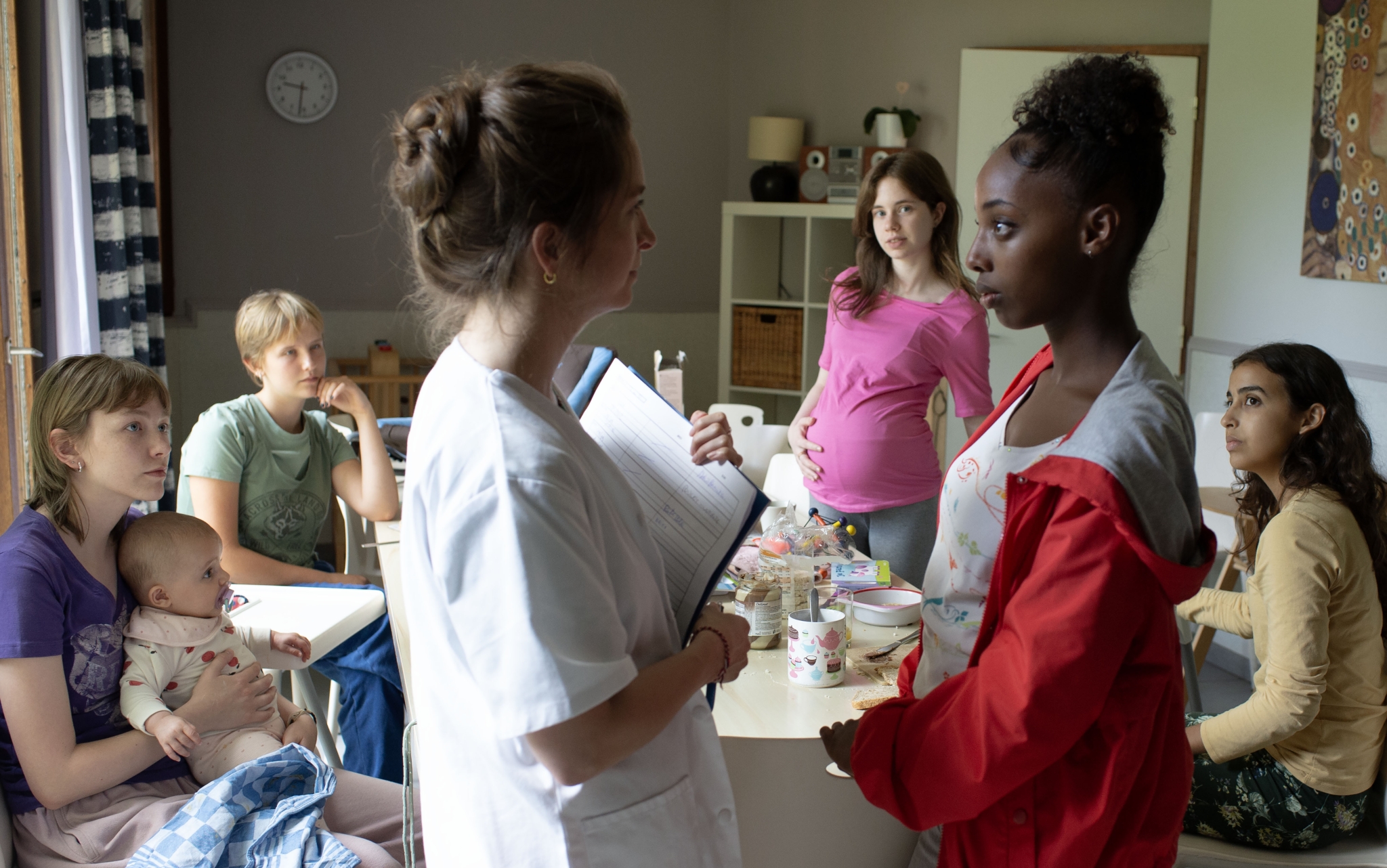
The Belgian director duo discuss their latest feature, set in a maternal support home.
In one especially affecting scene from the Dardenne brothers’ latest picture, Young Mothers, 15 year-old Ariane is having trouble fastening the buckle of her baby’s car seat. Though we’re only privy to her profile, she wears an overtly sorrowful expression, and yet the infant beams; unaware and unbothered by the situation playing out around them, their familiarity with the teenager elicits a bright smile and their eyes follow her around with great enthusiasm. “It was incredible,” recalls Luc Dardenne, at 71, the younger of the filmmaker siblings by three years. An earlier take had looked totally different he shares, sat beside his brother Jean-Pierre, in an office in central London: with the baby fast asleep, Ariane’s actions had projected something more sinister. “She wasn’t taking the responsibility fully,” Luc explains, via a translator; the emotional pull was off.
Ariane, played by Janaina Halloy-Fokan, is one of the titular young mothers living at a maternal support home near Liège, in the French-speaking Wallonia region of Belgium (the brothers birth city, and consequently the stage for much of their oeuvre, including their two Palme d’Or winners; 1999’s Rosetta, and The Child from 2005). At the centre, nurses, psychologists and social workers support the girls as they navigate pregnancy and the early stages of motherhood, additionally assisting those who choose to explore the foster system. Fiercely intimate with poverty, Ariane finds herself in this latter camp. Meanwhile Jessica (Babette Verbeek), whose bump reveal opens the film, is trying to find her own birth mother, desperate to learn the trajectory that meant she ended up in care, and Perla (Lucie Laruelle), who had envisioned making a home with her boyfriend (the father of her son), is coming to terms with his overwhelming disinterest. Then there’s Julie, played by Elsa Houben, whose loving fiancé and hairdressing apprenticeship offer a bright future, assuming she can fully overcome the addiction that previously left her homeless.
Screened at Cannes back in May – where it won Best Screenplay and took the Prize of the Ecumenical Jury – the picture, the pair’s 13th feature, hits many of the notes typical of a Dardenne brothers production, focused on marginalised individuals, employing a distinct over the shoulder camera angle, and working with new acting talent (this is the first big screen credit for most of the leads, all of whom were born between 2003 and 2008). “It’s always about people who are outside societies, who are excluded and how they’re going to resist, how they’re going to live,” offers Luc of the pair’s narrative anchor. “You can have a political discourse, but we’re not interested in that, it’s a question of feeling.”
Indeed, empathy and a non-infrequent gut punch are further common components of the Dardenne universe. But there’s also light to be found. Half an hour into Young Mothers, a fifth teenager is introduced just as her story is concluding. The four protagonists, their babies and several staff gather in the garden to bid farewell to Naïma (Samia Hilmi), who thanks them for their care and friendship. Reading her remarks from a piece for paper – a comfort for her nerves – she describes how she’s arrived at a place where she now feels comfortable in her status as a single mother, in turn, providing an optimistic image of the future for the remaining teens. Here, Jean-Pierre and Luc Dardenne discuss how the film took shape.
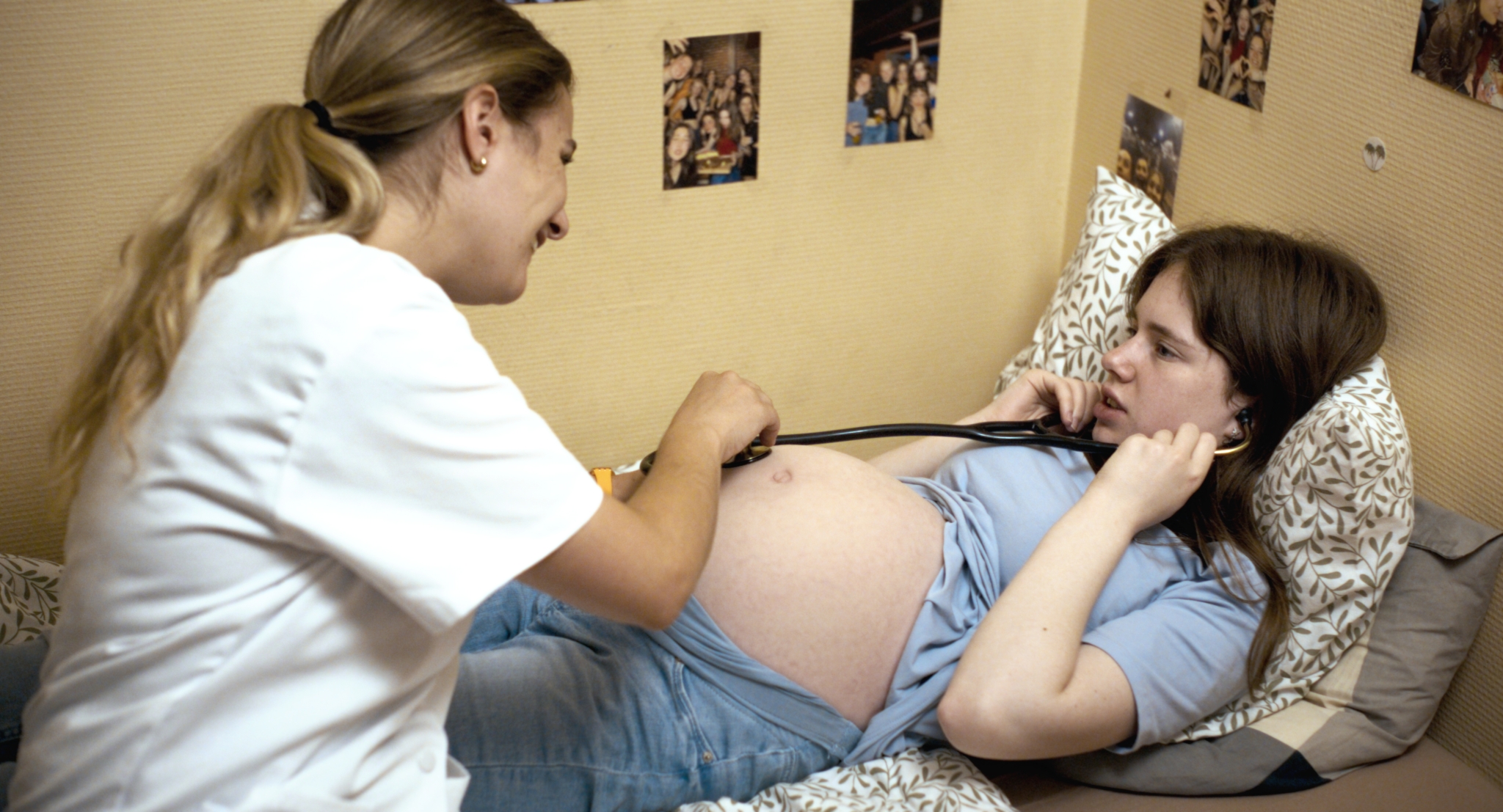
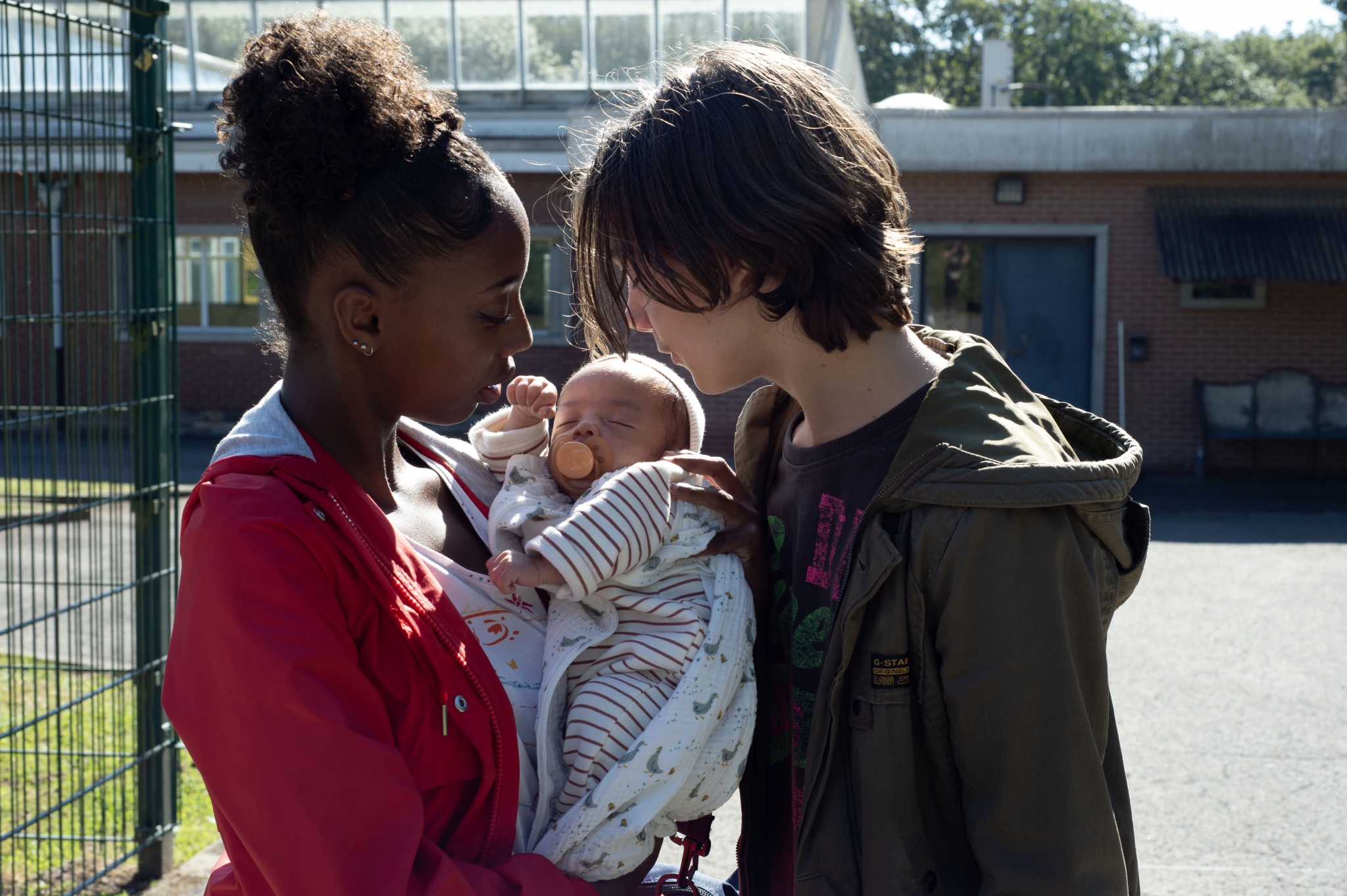
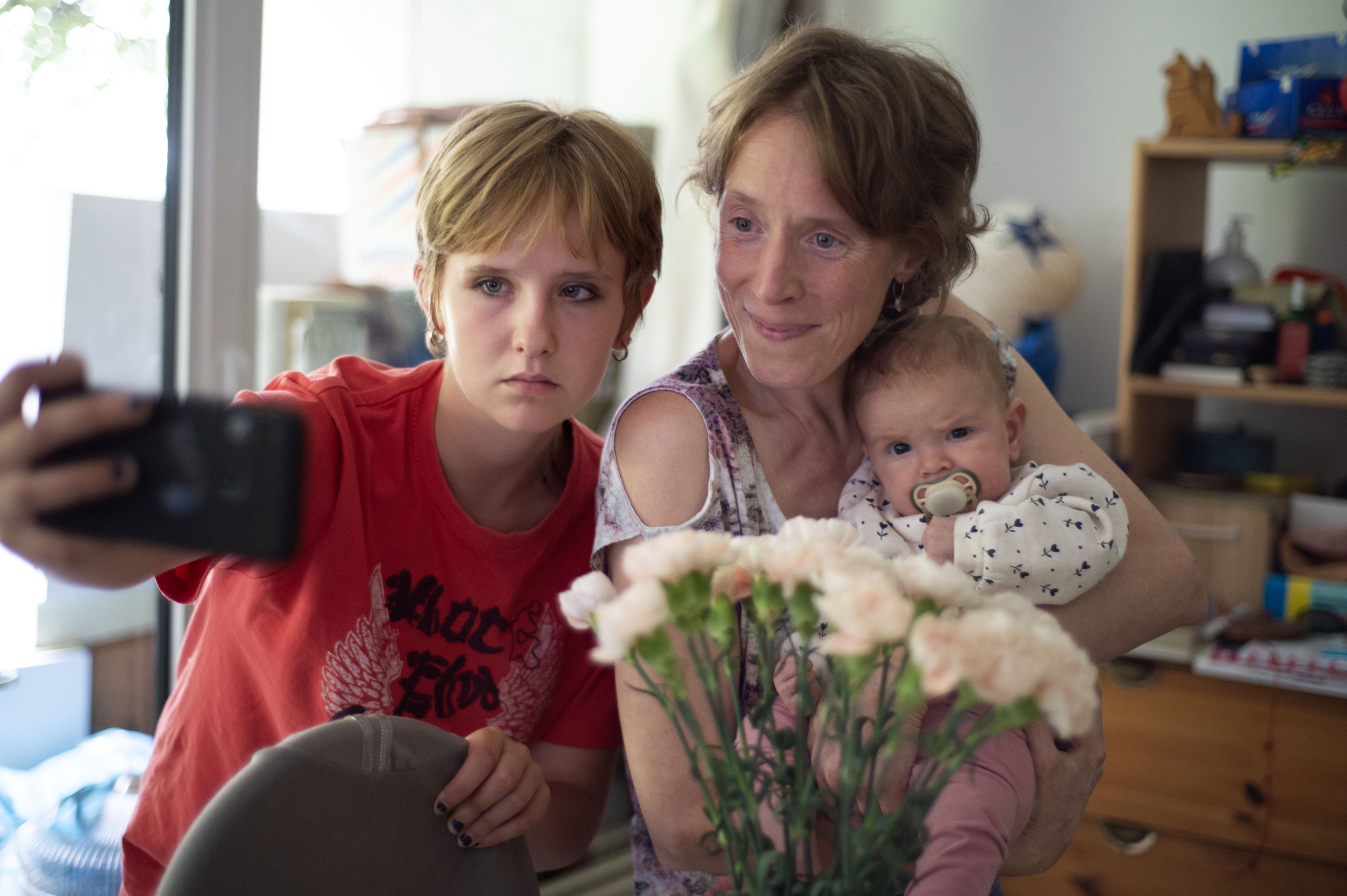
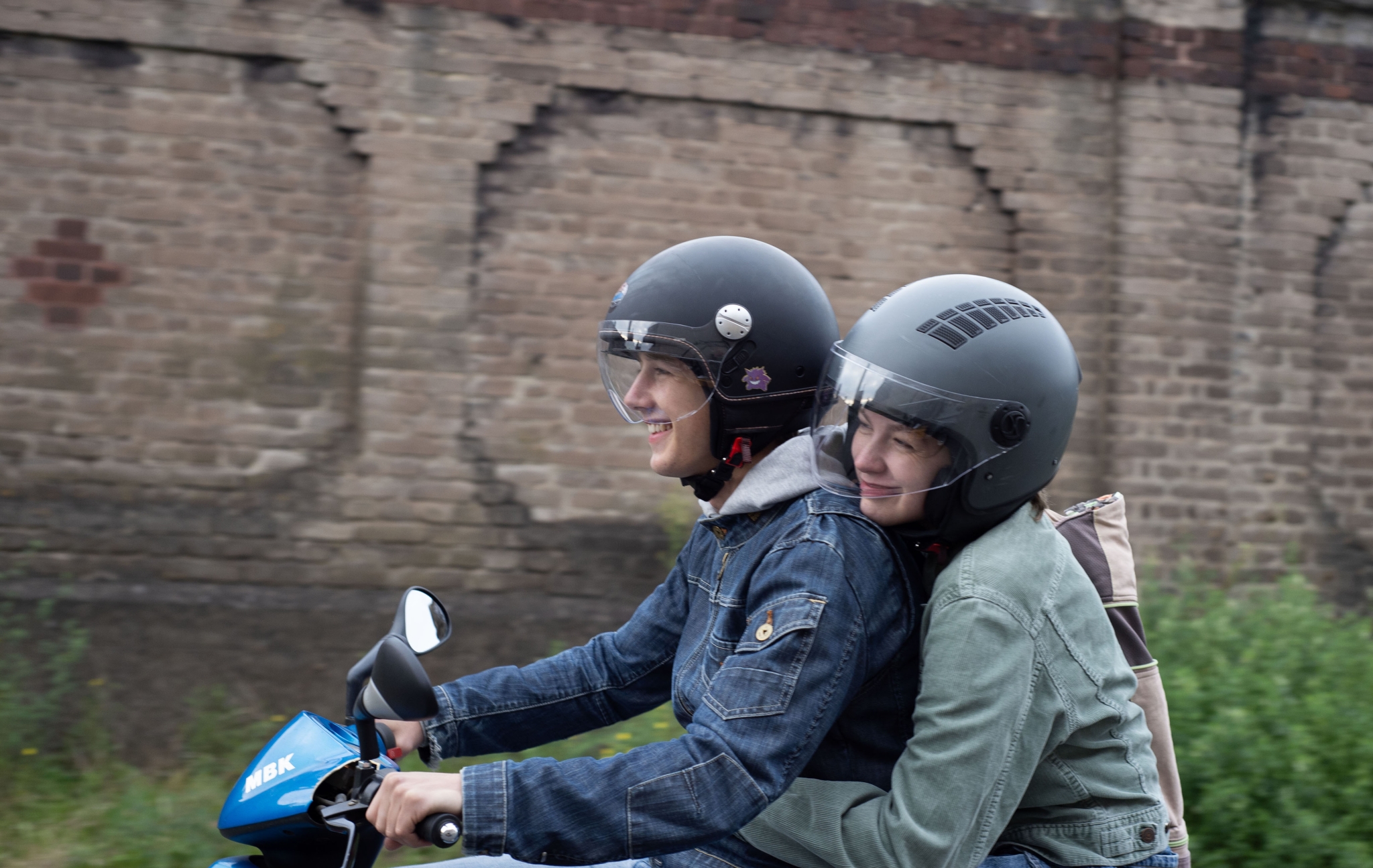
Zoe Whitfield: What was the earliest genesis for Young Mothers? What initially led you to visit a maternal support home?
Jean-Pierre Dardenne: The home itself inspired us to make this film. Initially, we went there for research, we had an idea of a script – a young mother going into this home, who couldn’t bond with her baby, she meets a young man who’s under the care of a psychiatric ward, and this meeting changes her relationship towards her baby. Going there several times over several months, we were just taken by the interactions between people – the care workers, social workers, the psychologists, and the young mothers and the babies, and the energy they brought. There was fragility of life, but also a strength of force. We didn’t choose, it just made sense to do something with the group.
ZW: Were the people you met quite forthcoming, in terms of opening up and sharing their stories?
Luc Dardenne: They’re minors, so because they’re under age, we’re not allowed to speak to them. And especially for us, why would they? This space enables them to live this difficult situation without shame, so we spoke a lot with the educators and the psychologists, but also chatted about life with the young women, not about their actual circumstances. The stories in the film are stories we invented. And we decided we wanted these five stories to interweave with each other, but we didn’t want to make a choral film, an ensemble piece, because even though they connect, they’re very much alone. There’s loneliness there. We also wanted each to have their own journey, with some hope at the end of their trajectory. The reality is actually sometimes very sad, but with our fiction, we wanted to invent possibilities so that, simply put, life wins over death.
ZW: And how did this dynamic, exploring five narratives as opposed to one or two, inform or disrupt your typical filmmaking practice?
J-PD: The biggest difference was the schedule of work; how do we organise this in 50 days? In relation to our past, we always start the first day of shooting with the first scene of our film, so here the challenge was, if we work that way, chronologically, how is it going to work? If we start with Jessica, then we let go of her to find Perla, and then three days later come back to Jessica, are we not going to lose something? In the end we did a mix.
LD: And there’s the babies as well, which makes it complicated, you can’t do several days in a row with babies. So all those factors adapted the work plan, but interestingly, working with five different characters enabled us to shoot much faster. We had a plan for 50 days and we actually shot in 38 days. Maybe next time if we have 10 main characters we’ll have an 18-day shoot [laughs].
J-PD: The fact that we can do this kind of speed, is because we had five weeks of rehearsal prior to starting the shoot.
It’s always about people who are outside societies, who are excluded and how they’re going to resist, how they’re going to live. You can have a political discourse, but we’re not interested in that, it’s a question of feeling.
Luc Dardenne
ZW: You mentioned the babies, and in the press notes that accompany the film, you write that “the babies should also appear as little people, not baby pictures.” I wondered if you could expand on this?
LD: You can’t lie, babies do what they want, you can’t control that. They’ll look at the camera [for example], or if there’s a microphone [they’ll look at that]. Something quite magical that happened as we rehearsed is that the babies got used to the mother, they would look at the screen mother and there was a connection. At the end, for example, when Ariane’s baby’s in the car seat, initially the baby was asleep, and we felt something wasn’t quite right. The young mother, to actually separate herself from her child, wasn’t taking the responsibility fully, on screen, because the baby was asleep – she was in a situation where one knows and one doesn’t, she takes advantage. So we waited until he woke up, and we don’t know why, but when he was there in his little car seat, he was really happy. He was happy to be there with his screen mother.
J-PD: A good actor.
LD: It was incredible, and it was also more interesting because he’s unaware of what’s going to happen, and her deep pain and sadness, and the fact that he even follows her with his eyes… That was a lovely surprise, and how we ended up filming faster, because the actresses were always good, so when the baby was good as well, job done.
ZW: It’s a beautiful scene. In terms of the actors who play the young mothers, can you speak on their casting – what was that process like, meeting them and exploring the story together? Was there any sense of collaboration, or were there films or performances you advised them to watch for inspiration?
J-PD: Never! Except our films! No, it’s a joke. We did sense that two or three felt obliged to watch a couple of our films… [laughs]. We did a classic casting, Luc’s son is a casting director, so it went through social media and we saw 150 young women, and kept five who we felt would best embody the characters. In terms of collaboration, I don’t know if that’s the right word, but as Luc mentioned, we rehearse for five weeks, and each actor comes with their own uniqueness. The most interesting thing is to see how this unique presence can give life to a character.
LD: We learned afterward that each of the five [mothers] had a particular relationship or link to abandonment. I’m not saying the parents of each woman abandoned them! But this is interesting, that they’ve all experienced something. And we also found out, at the premiere in Amsterdam, one of them said she didn’t like holding children, but through the film, she thought maybe it’s okay.
ZW: I mean that makes sense, most of them are still teenagers right?
J-PD: Yeah, it really is. And it’s about learning and training. It’s not easy, and you learn you want to, you don’t want to…
ZW: The film leans into themes you’ve explored before in your work – society, adolescence, family – but I wondered how or if your desire to make these stories has changed at all? Do you still have the same reasons for making such films?
LD: It’s always about people who are outside societies, who are excluded and how they’re going to resist, how they’re going to live. You can have a political discourse, but we’re not interested in that, it’s a question of feeling. We like those people, we like to see their struggle and how they fight, how they will pull through. Of course, there’s suffering and pain there, and showing that it’s hell on earth, but there’s also some way out. In the case of Young Mothers, 20 years ago [they would have been] completely stigmatised, there was no support – maybe through a religious institution, but now there’s this non-religious institution. There’s less of, ‘why did you have a child? Why did you keep it?’, because the religious institution was not supportive, it was really cruel, and all about sin. So it’s very different, and we were interested in the space now, and how it’s society that provides this support.
ZW: Young Mothers won best screenplay at Cannes earlier this year, and just this week it was announced that it will be Belgium’s submission for the Oscars. What do these accolades and this kind of recognition mean to you both?
J-PD: We’re happy, of course. We’re both delighted, I can speak for my brother too, but we just hope that it’s going to help the film reach a wider audience, perhaps an audience that would never necessarily see this. And of course, it can be only positive in terms of finance for the next film.
Young Mothers is out now.





